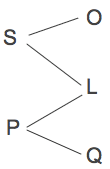Here's a step-by-step approach, taking the rules one at a time:
Diagramming the 1st rule (L and Q each perform at some time after P):

Adding the 2nd rule (S performs at some time before O and L):

Adding the 3rd rule (M performs at some time before S):

Adding the 4th rule (P performs at some time after N):

Adding the 5th and final rule (S and N each perform at some time after R):

You may notice that my earlier version of the game's final diagram had R a bit more to the bottom-left than I've depicted it above. Either way is fine. You have some flexibility with regard to exact appearance of the diagram.



I'm working on day one, and I just completed your pure sequencing and took forever. Then I read your explanation and diagram, read pages 272-293 in the bible, used your diagram for the problems (which was much simpler) and got all the diagramming drills correct and flew through the Decemeber 2000 Questions. Seriously it took me maybe 5 minutes. This is an amazing feeling, Steve. Thank you!
ReplyDeleteIs it the logic games bible ?
Deleteima need the bible after the lsat too lol
DeleteI'm having trouble answering #3. Is it A or C, and how do we know. Thanks Steve for the help
ReplyDeleteHi Steve, I got your 5 month planner, I'm loving it. Just quick question.. in a game like this would you recommend completing the diagram as we move on from one rule to the other (like you do here), or draw diagrams separately for each rule and then combine them later on into one big chunk? Sometimes rules do not collapse that well, so I find myself drawing a new diagram when I add one to the other, if you know what I mean... but again, drawing separately and then combining might be time consuming... what do you prefer?
ReplyDeletegreat picture of the weird magician.
ReplyDeleteI am also have problem with question # 3. Steve, please help! Thank you!
ReplyDelete#3 is MUST be true.
ReplyDeleteSelection D is the only one that HAS to be true.
Other selections COULD BE true which isn't asked for.
They say learn by doing.
This logic game has been a struggle for me too but keep pressing into it.
Opps! Make that selection C, not D.
ReplyDeleteHow do you understand which numbers are associated with which variable? For example, when it asks a question such as "A is the 5th car to be let out, which has to be true?" I don't understand how you take the letters/variables and put them in a numerical order.
ReplyDeleteAren't you concerned with positioning M, R and N to the left of both S and P, as we don't know everything about the relationship between S/N and P/M? Your diagram makes it look as if M, R and N are all before both S and P, but we don't know that this is true (and often pure sequencing questions will deliberately try to trick you on these types of issues). I'd love to hear your thoughts.
ReplyDeleteAn Arrested Development fan is always good company. --Stephanie from NYC
ReplyDeleteHi Steve, do you have a detailed explanation of your question 4 and 5 diagram somewhere? I am having particular trouble seeing how you placed the variables in question 5 specifically. Thanks
ReplyDeleteQuick question: Is the Logical Games Bible a must-buy?
ReplyDeleteMy problem is, once I get the test in front of me I draw a blank. Your diagram makes complete sense and I can see how each relates to the other.
ReplyDeletedo you have the explanations for the actual games?
ReplyDeletelike how did you arrive at each answer?
I don't understand how you got the answer for question #2?
ReplyDeleteThanks for your time Steve. However, I am unable to read the order of the elements accurately.
ReplyDeleteHello Steve, thank you so much for this diaphragm on logic games. This is truly a game changer for me. I’m a visual and hands on learner, and the break down you gave made it easy to understand.
ReplyDelete